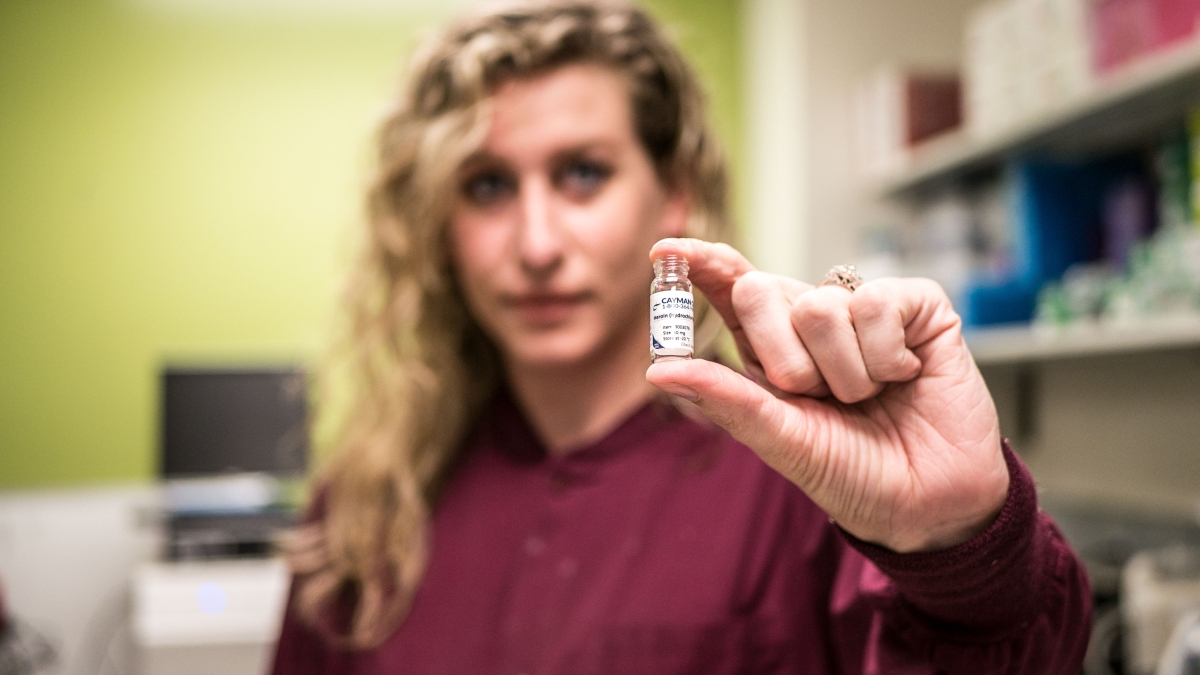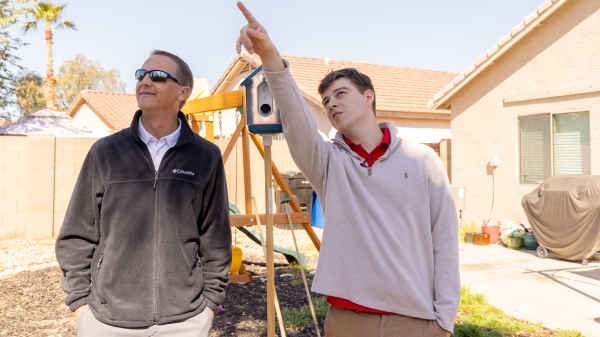Anterior insula activation restores prosocial behavior in animal model of opioid addiction

ASU's Seven Tomek holds a vial used to study the impact of opioids on prosocial behavior in an animal model. She and her colleagues found that activating the anterior insula in an animal model of opioid addiction restored prosocial behavior.
Are the social and interpersonal problems associated with opioid addiction reversible?
A new study in animals from the Arizona State University Department of Psychology suggests they are. Previously, the researchers used a model of opioid addiction and empathy to show that animals stopped prosocial behaviors — helping another animal — when heroin was available. The same research group has now shown that activating the anterior insula restored prosocial behaviors. The study will be published in Social Neuroscience and is now available online.
“As a master’s student, I led support groups for opioid addicts, and the biggest problems people wanted help dealing with were social. Our finding in an animal model of opioid addiction that chemogenetic activation of the anterior insula restores prosocial behavior suggests a glimmer of hope that some of the social behavioral deficits in opioid addiction are not permanent,” said Seven Tomek, who just defended her doctoral dissertation at ASU. Tomek is first author on the paper and received training in substance abuse treatment while earning her master’s degree in clinical psychology from the University of North Carolina, Wilmington.
To measure prosocial behavior, the researchers trained animals to free another animal that was trapped in a clear plastic tube. The animals had access to heroin for two weeks and then were given the choice of consuming heroin or helping another animal. Like before, the animals again chose heroin over helping another.
To try and restore the prosocial behaviors in the animals, the research team targeted a brain region involved in both prosocial behaviors like helping and addictive behaviors like craving: the anterior insula.
“We designed our animal study based on work in people showing that damage in the anterior insula area — from a stroke for example — was correlated with easily quitting cigarette smoking,” Tomek said. “This brain area is also important for motivation and emotions in people.”
The insula is nicknamed the “hidden lobe” because it is tucked underneath the brain’s frontal, parietal and temporal lobes. The research team used chemogenetic methods to activate the anterior insula. These methods work like a smart lock, letting scientists selectively activate specific types of neurons in a brain region.
“Once we activated the anterior insula, the animals started rescuing the trapped animals again,” Tomek said.
The research team tested the role of anterior insula activation twice. In the first experiment, the animals who underwent “activation” of the anterior insula helped other animals 67% of the time when heroin was available. The control group only helped other animals 17% of the time. In the second experiment, activation of the anterior insula was again associated with helping other animals 67% of the time. The second control group helped other animals 44% of the time.
“This work demonstrates an important role for the anterior insula in opioid addiction and shows the possibilities of changing a social behavior that has been compromised by drug use,” said Foster Olive, professor of psychology at ASU and senior author on the paper.
Gabriela Stegmann, Jonna Leyrer-Jackson and Jose Piña also contributed to the work. This study was supported by the National Institute on Drug Abuse, the Society of Addiction Psychology, and Arizona State University.
More Science and technology

Making magic happen: Engineering and designing theme parks
The themed entertainment industry is widespread and diverse, encompassing everything from theme parks to aquariums, zoos, water…

AI-equipped feeders allow ASU Online students to study bird behavior remotely
ASU Online students are participating in a research opportunity that's for the birds — literally. Online Bird Buddies is a…

National Humanities Center renews partnership with Lincoln Center for responsible AI research
The National Humanities Center has announced that Arizona State University's Lincoln Center for Applied Ethics is one of four…